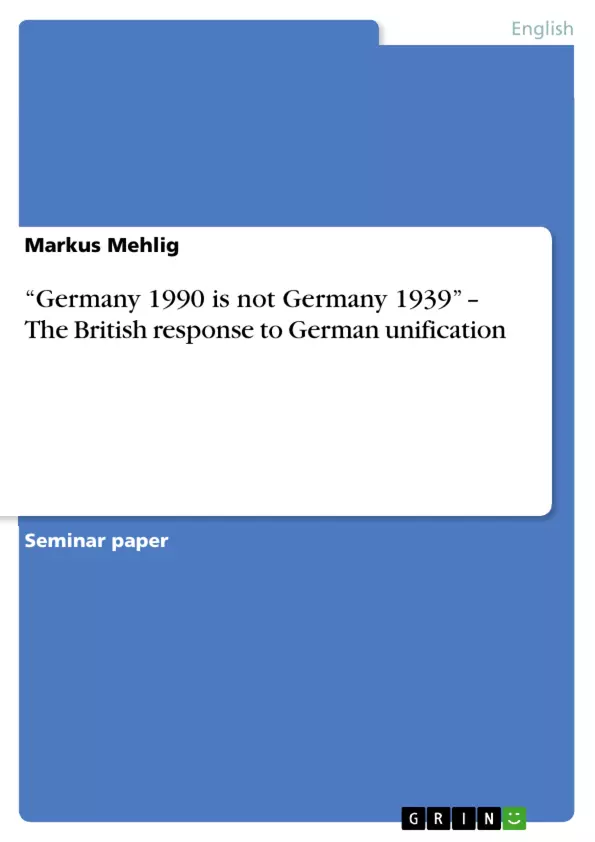When the first bricks and pieces of the Berlin Wall fell to the ground on 9 November
1989, the German soil might not have been the only thing that has been shaking on
that day: As soon as the news arrived in Number 10 Downing Street, London, the
floor in Margaret Thatcher’s office might have been shaking as well.
The metaphorical earthquake German reunification is considered today to have been
in those days did not only cause disorientation and confusion in both German states
but also in Great Britain.
Since the four victorious powers decided to split the German nation into four parts –
that later became only two – at the Yalta conference, the British felt save from their
greatest enemy during the Second World War. The balance of power between the
Soviet Union and the West seemed to be restored after the Cold War. Germany was
not strong enough to even try to start a new war, which caused a strong securely
feeling among the British people and its government.
Now, that this stony guarantee for peace got its first cracks it forced the peaceful
atmosphere – not only the British created in the bygone decades – to crack as well.
In this paper I want to describe the response of both British politicians and the British
people to the events that happened in the months between November 1989 and
October 1990, but mainly concentrate on two of the most important ones for British
politics during this time, namely the Nicholas Ridley affair and the revelation of the
minutes of the Chequers meeting.
The British press of course has not ignored these events. Since it became one of the
most important commentators on the upheaval that went on in Germany and the
British domestic discussions and affairs, I want to underline the statements and
comments made by politicians or other spokesperson of public opinions with excerpts
of British newspapers.
[...]
Table of Contents
- Introduction
- Germany 1989/1990 – The political-historic situation
- The British fear about the 'German question'
- Margaret Thatcher's response to German unification
- The Nicholas Ridley affair
- Public response to the Nicholas Ridley affair
- The Chequers meeting
- The press' response to the Chequers memorandum
- Conclusion
Objectives and Key Themes
This paper examines the British response to German reunification in the period between November 1989 and October 1990. It focuses on the concerns and anxieties of British politicians and the public towards a unified Germany, particularly analyzing the "Nicholas Ridley affair" and the Chequers meeting. The paper aims to understand how these events shaped British perceptions and policy responses to German reunification.
- The historical and political context surrounding German unification
- British anxieties and fears about a unified Germany
- The impact of the Nicholas Ridley affair on British public opinion and policy
- The significance of the Chequers meeting and its implications for British-German relations
- The role of the British press in shaping public opinion and political discourse
Chapter Summaries
The introductory chapter explores the historical and political context surrounding German reunification, emphasizing the anxieties and uncertainties felt by the British government and public in the wake of the Berlin Wall's fall. It highlights the historical context of Britain's relationship with Germany, particularly the shadow of World War II, and the sense of relief felt following the division of Germany in 1949. The chapter also sets the stage for the paper's focus on the Nicholas Ridley affair and the Chequers meeting.
Chapter two details the political and historical situation in Germany leading up to reunification, highlighting the events of 1989 and 1990, including the opening of the Hungarian border, the fall of the Berlin Wall, and the subsequent negotiations between East and West Germany. It provides context for the British anxieties about the 'German question' explored in the subsequent chapter.
Keywords
This paper focuses on the British response to German reunification, exploring the themes of historical anxieties, political concerns, public opinion, and diplomatic relations. It examines key events such as the Nicholas Ridley affair, the Chequers meeting, and the role of the British press in shaping public discourse. The paper also explores broader concepts like the 'German question,' the Cold War, and the European integration process in the context of German unification.
Frequently Asked Questions
How did Britain react to German unification in 1990?
The reaction was marked by disorientation, confusion, and deep-seated historical anxieties, particularly within Margaret Thatcher's government.
What was the "Nicholas Ridley affair"?
It was a political scandal caused by a minister's controversial interview expressing fears about German dominance and comparing European integration to Nazi goals.
What was the Chequers meeting?
A seminar organized by Thatcher with historians to discuss the "German national character" and the potential dangers of a reunified Germany.
Why did the British fear a unified Germany?
The primary fear was the loss of the balance of power in Europe and a return to German economic and political hegemony.
What role did the British press play during this time?
The press acted as a major commentator, often highlighting and amplifying the domestic discussions and political scandals regarding the 'German question'.
- Arbeit zitieren
- Markus Mehlig (Autor:in), 2009, “Germany 1990 is not Germany 1939” – The British response to German unification, München, GRIN Verlag, https://www.grin.com/document/126192



